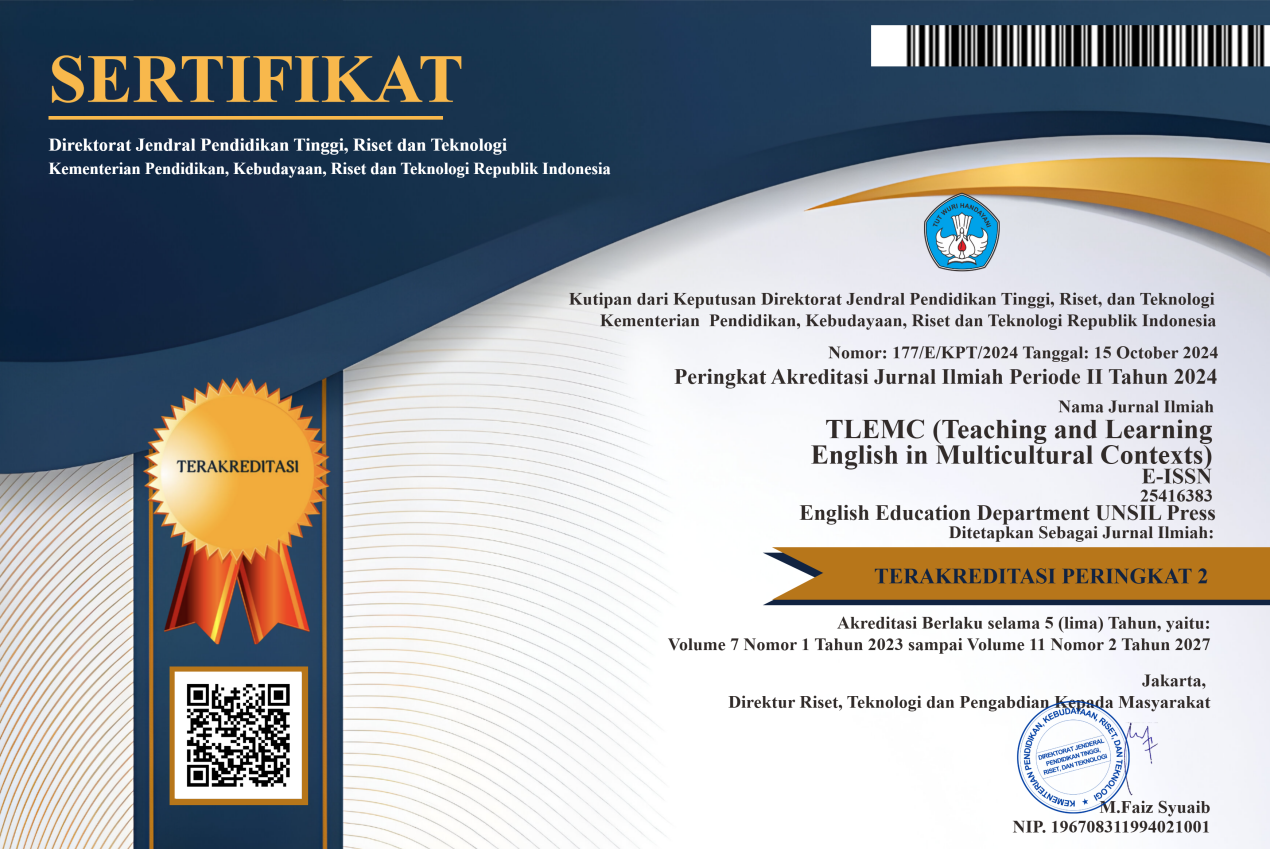Oral Corrective Feedback: What do Students Prefer and Why?
Abstract
Corrective feedback is crucial for students to improve their speaking skill. The feedback is as important as the way of delivering it to students. Lecturers need to acknowledge students’ preferences on corrective feedback, so it will be useful for students’ speaking improvement. This study aims at investigating (1) the amount of corrective feedback that students think most useful and its reason, (2) types of corrective feedback that students think most useful and its reason. This study utilizes mixed method. Both close-ended and open-ended questionnaire are used to gain the data. The result shows that students need the lecturer to mark all their errors during speaking. When lecturer marks all their error, they will remember the correction and will never repeat the same mistake in the future. Furthermore, students also need the lecturer to mark their mistakes every time they make it to avoid them making the same mistake on the other occasion. In this study, most students prefer explicit correction as the useful way that can be done by lecturer to deliver the corrective feedback. Students need lecturer to do that way to give feedback in term of grammar, pronunciation and vocabulary or word choice. Explicit correction is saving time since it does not need further explanation why a certain word’s choice, word’s pronunciation or grammar is incorrect. It is also efficient because lecturer does not need to wait for students to think about or to guess the right form of certain word’s choice, word’s pronunciation or grammar.
Keywords: Oral Corrective, Feedback, Students’ Preference, Speaking Skill
Full Text:
PDFReferences
Brown (2004). Language Assessment principles and Classroom Practice. New York: Pearson Education, Inc.
Brown. H. Douglas. (2007). Principles of Language Learning and Teaching Fifth Edition. New York: Pears on Education, Inc.
Brown. A. (2009). Students’ and teachers’ perceptions of effective foreign language teaching: A comparison of ideals. Modern Language Journal, 93, 46-60.
Carroll, S., & Swain, M. (1993). Explicit and implicit negative feedback: An empirical study of the learning of linguistic generalization. Studies in Second Language Acquisition, 15(3), 357-386.
Chaudron, C. (1977). A descriptive model of discourse in the corrective treatment of learners' errors. Language Learning, 27(1), 29-46.
Edge, J. (1989). Mistakes and correction. New York: Longman.
Ellis, R. (2009). Corrective feedback and teacher development. L2 Journal, 1(1), 3-18.
Hendrickson, J. (1978). Error correction in foreign language teaching: Recent research and practice. Modern Language Journal, 62(8), 387-398.
Loewen, S. (2012). The role of feedback. In A. Mackey & S. Gass (Eds.), The Routlege Handbook of Second Language Acquisition (pp. 24-40). Malden, MA: Wiley Blackwell.
Lyster, R., & Ranta, L. (1997). Corrective feedback and learner uptake: Negotiation of form in communicative classrooms. Studies in Second Language Acquisition, 19(1), 37-66.
Lyster, R., & Saito, K. (2010). Oral feedback in classroom SLA: A meta-analysis. Studies in Second Language Acquisition, 32(2), 265-302.
Mendez, E. H., & del Rosario Reyes Cruz, M. (2012). Teachers' perceptions about oral corrective feedback and their practice in EFL classrooms. Profile Issues in Teachers' Professional Development, 14(2), 63-75.
Muhammad, R. N. (2019). Increasing Students’ Awareness in Speaking Participation. Journal of English Teaching, Literature, and Applied Linguistics, 3(1).
Schachter, J. (1991). Corrective feedback in historical perspective. Second Language Research, 7(2), 89-102.
Schulz, R. A. (2001). Cultural differences in student and teacher perceptions concerning the role of grammar instruction and corrective feedback: USA-Columbia. Modern Language Journal, 85,244-258.
Sheen, Y. (2004). Corrective feedback and learner uptake in communicative classrooms across instructional settings. Language Teaching Research, 8(2), 263-300.
Sheen, Y. (2007). The effects of corrective feedback, language aptitude, and learner attitudes on the acquisition of English articles. In A. Mackey (Ed.), Conversation interaction in second language acquisition: A collection of empirical studies (pp. 301-322). Oxford: Oxford University Press.
Sheen, Y. (2011). Corrective feedback, individual differences and second language learning. New York: Springer.
Sheen, Y., & Ellis, R. (2011). Corrective feedback in language teaching. In E. Hinkel (Ed.), Handbook of research in second language teaching and learning (Vol. 2, pp. 593-610). New York: Routledge.
Richards, Jack C. and Renandya, Willy A. (2002).Methodology in Language Teaching : An Anthology of Current Practice. New York: Cambridge University Press.
Sutarsyah, C. (2017). An analysis of student’s speaking anxiety and its effect on speaking performance. IJELTAL (Indonesian Journal of English Language Teaching and Applied Linguistics), 1(2), 143-152.
Tedick, D. and Gortari, B. (1998). Research on Error Correction and Implications for Classroom Teaching. The Bridge, ACIE Newsletter. Center for Advanced Research on Language Acquisition, University of Minnesota, v1. [Online] http://www.carla.umn.edu/immersion/acie/vol1/May1998.pdf.
Wörtwein, T., Chollet, M., Schauerte, B., Morency, L. P., Stiefelhagen, R., & Scherer, S. (2015). Multimodal public speaking performance assessment. In Proceedings of the 2015 ACM on International Conference on Multimodal Interaction (pp. 43-50).
Yoshida, R. (2008). Learners' perceptions of corrective feedback in pair work. Foreign Language Annals, 41(3), 525-541.
DOI: https://doi.org/10.37058/tlemc.v6i2.2766
Refbacks
- There are currently no refbacks.
INDEXED BY:
This work is licensed under a Creative Commons Attribution-NonCommercial-ShareAlike 4.0 International License.
![]()
TLEMC (Teaching and Learning English in Multicultural Contexts)
Program Studi Pendidikan Bahasa Inggris
Fakultas Keguruan dan Ilmu Pendidikan
Universitas Siliwangi
Jl. Siliwangi No. 24 Kota Tasikmalaya - 46115
email: tlemc@unsil.ac.id





